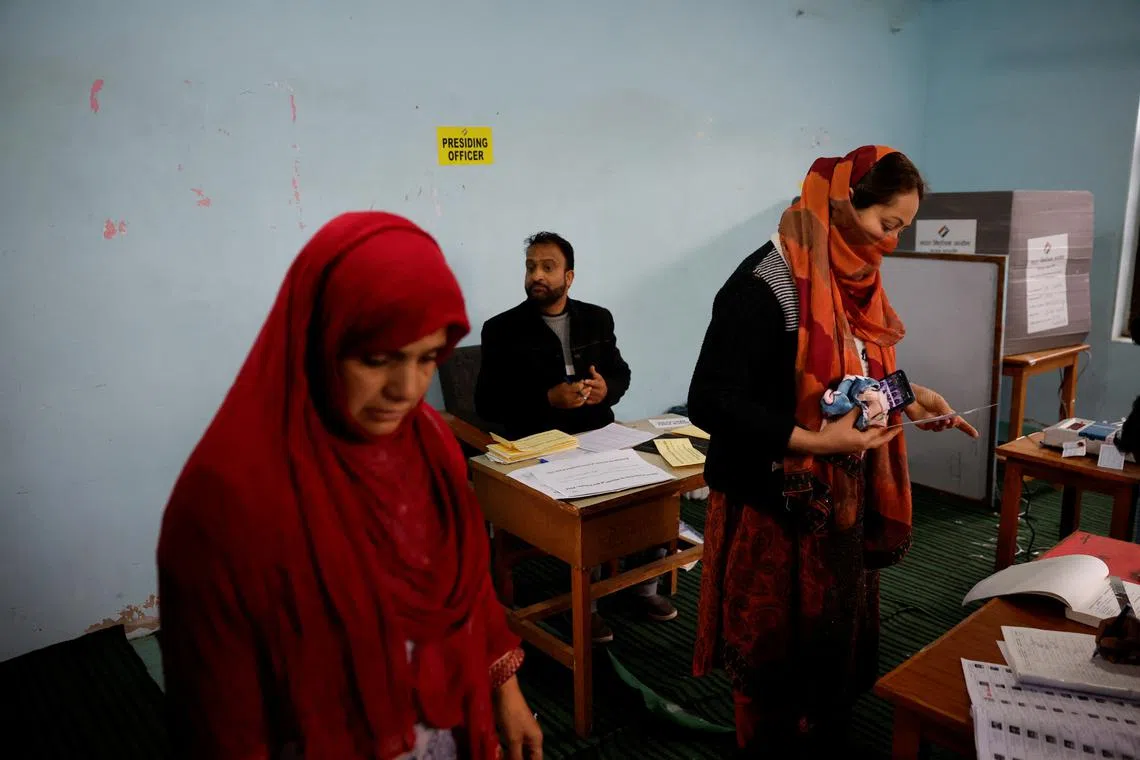Indian election enters fourth phase as rhetoric over religion, inequality sharpens
Sign up now: Get insights on Asia's fast-moving developments

The lower turnout has raised doubts over whether the Bharatiya Janata Party and its allies can win the landslide predicted by opinion polls.
PHOTO: REUTERS
Follow topic:
HYDERABAD/BHUBANESWAR – India voted on May 13 in the fourth phase of a seven-week-long general election, as campaign rhetoric became more strident over economic disparities and religious divisions, while soaring summer temperatures posed a challenge for some voters.
The world’s most populous nation began voting on April 19 in a seven-phase election
Prime Minister Narendra Modi is seeking a rare, third straight term in a vote that pits his Hindu nationalist Bharatiya Janata Party (BJP) against an alliance of more than two dozen opposition parties, including main rival Congress.
“I appeal to all to vote for a decisive government,” said Mr Amit Shah, Mr Modi’s powerful aide and the country’s Interior Affairs Minister, as voting began.
The polling on May 13 is for 96 seats in 10 states and territories, largely covering the southern and eastern states of Telangana, Andhra Pradesh and Odisha where the BJP is not as strong as in other parts of the country.
Srinagar, the main city of the troubled Kashmir Valley, is also voting for the first time since Mr Modi’s 2019 move to remove its semi-autonomy.
But the BJP is not contesting there, as analysts said the outcome was likely to contradict Mr Modi’s narrative of a peaceful, more integrated Kashmir since 2019.
The police imposed restrictions on gatherings ahead of the vote in the militarised region, while opposition parties said their workers were arrested, which the police denied.
Former Jammu and Kashmir state chief minister Farooq Abdullah, president of the National Conference party, said Mr Modi and Mr Shah “will definitely get defeated” nationally.
Mr Asaduddin Owaisi, a prominent Muslim lawmaker contesting in the southern city of Hyderabad, which also voted on May 13, said the BJP had fewer supporters after Mr Modi’s recent “venomous” comments against minority Muslims.
“An individual cannot be bigger than the country. So, Modi is not the country, a country is way bigger than any politician,” he said.
Mr Modi has said that he does not oppose Muslims and his government does not discriminate against them.
Analysts have raised doubts over whether the BJP and its allies can win by the landslide predicted by opinion polls, and said that the lower turnout had prompted Mr Modi to change his campaign’s tack after the first phase.
Mr Modi has shifted the campaign’s focus from his economic record to accusing the Congress of planning to extend welfare benefits to Muslims at the expense of disadvantaged tribal groups and Hindu castes.
In April, he said the Congress planned to redistribute the wealth of majority Hindus among Muslims, whom he referred to as “infiltrators” who have “more children”.
Congress has denied making any such promise and has said Mr Modi is rattled by the turnout, which the BJP denies.
About 80 per cent of India’s 1.4 billion people are Hindus but the country also has the world’s third-largest Muslim population of about 200 million people. Surveys suggest voters are most concerned about unemployment and price hikes.
Congress is pitching for better representation and welfare programmes for India’s poor and disadvantaged groups, stating that wealth inequality has worsened during Mr Modi’s 10-year term, a charge rejected by the government.
“Do not get deterred by the diversionary tactics of hateful speeches which divide the society,” Congress president Mallikarjun Kharge said in a social media post.
Turnout is being closely watched as marginally lower numbers in the first three phases have raised concerns about voter disinterest in an election without a strong, central issue.
The opposition India alliance led by Congress got a shot in the arm ahead of May 13’s vote when the Supreme Court gave temporary bail to Arvind Kejriwal,
The impact of hot weather on voting is also being monitored with maximums in many parts of the country touching 40 deg C or higher in the past week, although the weather department expects temperatures to be normal during May 13’s vote. REUTERS

